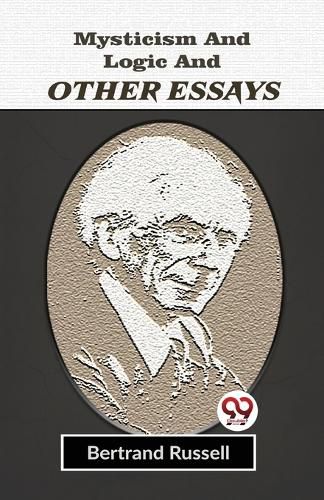Readings Newsletter
Become a Readings Member to make your shopping experience even easier.
Sign in or sign up for free!
You’re not far away from qualifying for FREE standard shipping within Australia
You’ve qualified for FREE standard shipping within Australia
The cart is loading…






This title is printed to order. This book may have been self-published. If so, we cannot guarantee the quality of the content. In the main most books will have gone through the editing process however some may not. We therefore suggest that you be aware of this before ordering this book. If in doubt check either the author or publisher’s details as we are unable to accept any returns unless they are faulty. Please contact us if you have any questions.
Bertrand Russell released a collection of articles titled "Mysticism and Logic and Other Essays" in 1917. The pieces discuss a variety of subjects, including the essence of truth, the boundaries of knowledge, and the interaction between science and religion. In the first article, "Mysticism and Logic," the distinctions between mystical and scientific modes of thought are explored. Russell contends that science is supported by logic and factual data, while mysticism is based on faith and intuition. Russell argues in "The Role of Science in a Liberal Education" that science is crucial to a well-rounded education because it fosters skepticism and critical thinking. The writings "The Study of Mathematics," "On Scientific Method in Philosophy," and "The Ultimate Constituents of Matter" are among the others in the book. These writings examine issues including the nature of reality, the philosophy of mathematics, and the connection between science and philosophy. "Mysticism and Logic and Other Essays" is a tough and thought-provoking collection of articles that explores some of the most important issues surrounding human life. Russell writes in a straightforward, succinct manner, and his points are well substantiated. The writings continue to be a helpful resource for anybody interested in philosophy, science, or the nature of knowing and are still read and debated extensively today.
$9.00 standard shipping within Australia
FREE standard shipping within Australia for orders over $100.00
Express & International shipping calculated at checkout
This title is printed to order. This book may have been self-published. If so, we cannot guarantee the quality of the content. In the main most books will have gone through the editing process however some may not. We therefore suggest that you be aware of this before ordering this book. If in doubt check either the author or publisher’s details as we are unable to accept any returns unless they are faulty. Please contact us if you have any questions.
Bertrand Russell released a collection of articles titled "Mysticism and Logic and Other Essays" in 1917. The pieces discuss a variety of subjects, including the essence of truth, the boundaries of knowledge, and the interaction between science and religion. In the first article, "Mysticism and Logic," the distinctions between mystical and scientific modes of thought are explored. Russell contends that science is supported by logic and factual data, while mysticism is based on faith and intuition. Russell argues in "The Role of Science in a Liberal Education" that science is crucial to a well-rounded education because it fosters skepticism and critical thinking. The writings "The Study of Mathematics," "On Scientific Method in Philosophy," and "The Ultimate Constituents of Matter" are among the others in the book. These writings examine issues including the nature of reality, the philosophy of mathematics, and the connection between science and philosophy. "Mysticism and Logic and Other Essays" is a tough and thought-provoking collection of articles that explores some of the most important issues surrounding human life. Russell writes in a straightforward, succinct manner, and his points are well substantiated. The writings continue to be a helpful resource for anybody interested in philosophy, science, or the nature of knowing and are still read and debated extensively today.